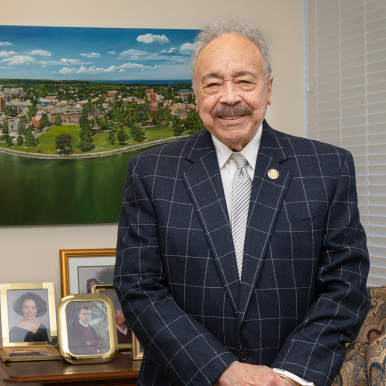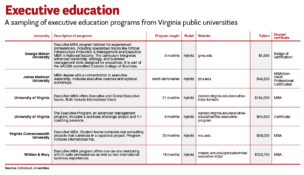
A member of President Joe Biden’s HBCUs advisory board, Virginia State University President Makola Abdullah (third from left) is hopeful that the General Assembly will consider boosting funding for Virginia’s historically Black colleges and universities. Photo courtesy Virginia State University

A member of President Joe Biden’s HBCUs advisory board, Virginia State University President Makola Abdullah (third from left) is hopeful that the General Assembly will consider boosting funding for Virginia’s historically Black colleges and universities. Photo courtesy Virginia State University
A fair share
Officials advocate for increased HBCU funding
Virginia’s first Black governor says it’s past time for the state’s historically Black colleges and universities to receive their fair share of the pie.
Former Gov. L. Douglas Wilder, a Virginia Union University alumnus, jokes that he has been advocating for increased state funding for Virginia HBCUs “for about a hundred years.”
The Biden administration gave a push in that direction last September in letters to 16 Southern governors — including Virginia Republican Gov. Glenn Youngkin — calling on them to correct what it calls decadeslong underfunding of 16 land-grant HBCUs in their states. According to the White House, states underfunded these schools by $13 billion from 1987 to 2020.
The commonwealth has two land-grant schools — Virginia Tech in Blacksburg and Virginia State University in Ettrick, an HBCU founded in 1882. Federal officials estimate that VSU is owed more than $277 million in state funding.
Land-grant schools were established by the 1862 Morrill Act, under which the federal government provided money to create 57 public colleges for agriculture and engineering. States generally provide required dollar-to-dollar matches for these institutions. During the days of racial segregation in the South, Black students were unable to attend colleges established by the 1862 act, so a separate Morrill Act system was set up in 1890.
Youngkin’s administration has denied that the commonwealth has underfunded VSU compared with Virginia Tech, and expressed skepticism over how federal officials came up with the numbers.
Wilder, a Democrat, says he’s written to Youngkin on the subject. “The underfunding has been documented at the federal level. I say to the governor, ‘Start putting money in the budget for HCBUs — all of them.’ This has been ignored too long by too many.”

The 93-year-old Wilder, the nation’s first Black governor since the Reconstruction era and later Richmond’s first popularly elected mayor, is now a distinguished professor at the Virginia Commonwealth University’s Wilder School of Government and Public Affairs named for him. Last September, the school’s annual Wilder Symposium addressed the topic of HBCU funding head-on under the title, “HBCUs and the Absence of Support.”
Under Youngkin’s proposed 2024-26 state budget, released in December 2023, VSU’s operating funding would go up about 9.2% — from $232 million for fiscal 2024 to $250 million proposed in 2025. The Democratic-controlled state legislature will get a crack at the budget to make amendments (likely in a special session this spring) before submitting it to the governor to sign.
There are multiple ways of advocating for more funding, Wilder says. In 2006, a group of alumni and supporters of Maryland’s HBCUs filed a federal lawsuit accusing the state government of providing inequitable resources to its four historically Black schools. In 2021, Maryland reached a $577 million settlement to end the lawsuit.
Wilder says he’s not advocating that Virginia HBCU supporters follow Maryland’s example, but he notes that both chambers of the General Assembly have significant Black leadership, including the state’s first Black speaker of the House of Delegates, Del. Don Scott.
“I don’t think a lawsuit is necessary,” Wilder says. But if HBCUs are not better funded, “we’ll say that your projects likewise will not be funded. There will be no pie for you if there’s no pie for me. … Power concedes nothing without demand. Now that we people of color can do something, we need to do it.”
Economic drivers
Virginia State University President Makola Abdullah, who serves on President Joe Biden’s HBCUs advisory board and is board chair of the Association of Public and Land-grant Universities, expresses hope that the General Assembly recognizes the value of investing in HBCUs and will be “receptive” to funding increases. “It’s exciting that we’ve reached the point where this conversation is happening” in Virginia, he says.
VSU ranks No. 26 in U.S. News and World Report’s list of Best Overall HBCUs for 2023, and its enrollment grew by 8% for fall 2022 and another 11% in fall 2023, surpassing 5,000 students. In 2021, Virginia State got a major boost in the form of a record-setting $30 million gift from philanthropist MacKenzie Scott, ex-wife of Amazon.com founder Jeff Bezos. She also donated $40 million to Norfolk State University, part of a series of donations to HBCUs and other traditionally underfunded institutions.
Major donations are important, but consistent public funding would translate into more scholarships, increased financial aid and updated technology and equipment, VSU’s president says. More than that, increased resources would mean that “the entire community would be uplifted,” Abdullah says. “VSU is a premier economic driver in Petersburg.”
Land-grant schools such as VSU “invest so much back into rural America,” says U.S. Rep. Abigail Spanberger, a Democrat who serves on the House Agriculture Committee and in December 2023 launched her bid for the Democratic gubernatorial nomination.
Speaking at the 1890 Land Grant Universities Recognition event co-hosted last September in Washington, D.C., by the nonprofit 1890 Universities Foundation, she told the audience that “back home in Virginia, I have heard from our farmers and our institutions of higher education about the critical nexus between research and the success of Virginia’s No. 1 private industry — agriculture.”
In the past three decades, “more than $275 million should have been available for Virginia State University, had it received state funding per student equal to that of Virginia Tech,” according to Spanberger. “This is unacceptable; those investments could have supported more infrastructure, more student services, and the ability to compete for research grants to better serve Virginia’s students. We need to do better.”
Acknowledging disparity
Although the Biden administration’s letter was specifically aimed at land-grant schools, “it comes at a time when we’re trying to get Virginia to do more for all Black schools,” says James W. Dyke Jr., senior advisor for McGuireWoods Consulting in Tysons.
“This has been going on a long time. Black schools have always received less funding. It’s built up over the years. I think everybody acknowledges the disparity,” says Howard University alumnus Dyke, who was Virginia’s education secretary under Wilder and has worked in recent years on increased funding for HBCUs.
Now is an especially important time to allocate more money to HBCUs, Dyke says. While many institutions around the country are struggling to attract students, enrollment at HBCUs is on the rise, increasing 57% by 2022, according to a National Center for Education Statistics report last spring.
And after the U.S. Supreme Court overturned affirmative action at most colleges and universities last June, Dyke says, “I think there will be more demand.”
He’s far from alone in that assessment. According to a July 2023 report by Inside Higher Ed, HBCU leaders are expecting more applications. While more interest is generally welcome, administrators at HBCUs nationwide expressed concern that they don’t have the resources and infrastructure to accept more students.
Currently, predominantly Black universities produce 20% of Black college graduates in the country but face significant underfunding compared with predominately white institutions, according to the Wilder Symposium, which billed it as “a crisis that impacts financial support for students, technology resources, and building infrastructure.”
It’s in the best interest of businesses and communities to better support all HBCUs, Wilder says. “Businesses are looking for leadership to come from all of their schools in Virginia. They need a [workforce] pipeline. We produce the doctors, the lawyers, the engineers.”
Like other higher ed institutions, HBCUs are not a monolith. Some, like NSU and VSU, are public universities that receive federal, state and private funding, while others are private universities that rely on tuition, donations and endowments. In Virginia, Hampton University, Virginia Union University and Virginia University of Lynchburg are the state’s private HBCUs.
In 2022, Virginia Attorney Gen. Jason Miyares, a Republican who is rumored to be eyeing a 2025 gubernatorial run, wrote that the state’s laws and constitution allow some public funding of private HBCUs — through the Tuition Assistance Grant program for individual students and with loans to universities through the Virginia College Building Authority.
“This is a significant moment in time for HBCUs,” Virginia Union University President Hakim J. Lucas said when Miyares made that determination.
William R. Harvey, who retired in 2022 after 44 years as president of Hampton University, knows about the effort it takes to attract donations and has advice for other private HBCUs.
When Harvey became HU’s president almost half a century ago, the university’s “finances were in bad shape. They had not balanced the budget. Physical buildings had decayed.” The school’s endowment was $29 million.
Harvey and his team went to work, and “people responded.” At his retirement, Hampton’s endowment contained more than $400 million, a 1,279% increase. MacKenzie Scott also made a $30 million donation to the school in 2020, its largest donation. But that endowment increase also reflects support from nonbillionaire donors.
People responded, Harvey says, because “we asked them to fund specific projects. We didn’t ask for $50 million, we asked for the proton center.” That’s the $225 million Hampton University Proton Therapy Institute (HUPTI), which employs proton treatments on a variety of cancers. The facility opened in 2010, funded by private donors and regional lenders, as well as some public support from the state and federal governments.
Harvey views the institute as a “classic example” of how Hampton and other HBCUs are helping their communities. “We are curing cancer. Cancer is the No. 1 killer in Virginia. We are easing human misery and saving lives.”
Virginia HBCUs at a glance
Virginia has five historically Black colleges and universities, spread across Hampton Roads and Central Virginia. Some of the oldest in the nation, these institutions are a mix of public and privately run schools.
Hampton University
Located in Hampton, the private, not-for-profit university is on 314 acres and has 3,649 students, 3,255 of them undergraduates.1 It was founded in 1868 as Hampton Normal and Agricultural Institute. In July 2022, Hampton welcomed its new president, retired U.S. Army Lt. Gen. Darrell K. Williams; he succeeds William R. Harvey, who had served as the university’s president since 1978.
Norfolk State University
The four-year public school near downtown Norfolk was founded in 1935. It has a 134-acre campus and has 6,045 students. NSU’s December 2021 commencement speech was delivered by music superstar and Virginia Beach native Pharrell Williams, who also hosted his Elephant in the Room business forum at NSU that year. NSU unveiled its 6,000-square-foot Micron-NSU Nanofabrication Cleanroom in October 2021.
Virginia State University
Virginia State University was founded in 1882 as one of Virginia’s two public land-grant institutions (the other is Virginia Tech). Located in Chesterfield County’s Ettrick area near Petersburg, its 231-acre campus overlooks the Appomattox River. VSU has 5,190 students, 4,829 of them undergraduates.
Virginia Union University
The private university was founded in 1865. Hartshorn Memorial College, a women’s college established in Richmond in 1883, became part of VUU in 1932. Storer College, a Black Baptist college in West Virginia that closed in 1955, merged its endowment with VUU. The university has 1,704 students, 1,227 of them undergraduates.1
Virginia University of Lynchburg
Virginia University of Lynchburg traces its origins to the 1886 founding of the Lynchburg Baptist Seminary. Renamed over the years, VUL was incorporated as Virginia University of Lynchburg in 1996. The private not-for-profit school has 837 students, 479 of them undergraduates.2
1 Fall 2022
2 National Center for Education Statistics
t

















